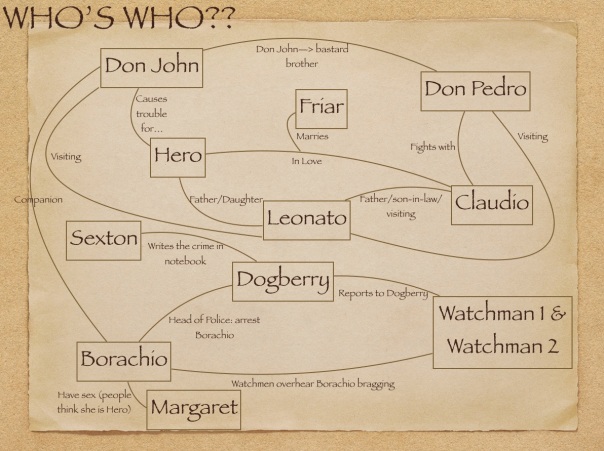Analysis of the Main Characters
**Important note: It is important to remember when reading this section that the only characters referred to are the ones being ‘used’ in our groups specific performance. There are many more important characters within the play, however the ones discussed below are the ones relevant to our performance and your understanding**
 Don John: “Born under Saturn” (Act I Scene I)
Don John: “Born under Saturn” (Act I Scene I)
As the character map shows Don John is the bastard brother of Don Pedro. He is malicious, menacing and an overall troublemaker. Don John focuses most of his energy in the play into stopping the wedding between Claudio and Hero, and causing Hero mass humiliation by putting her virginity into question resulting in Claudio leaving her at the alter. Don Johns character is hinted at in Act I Scene I whereby he declares that he was ‘born under Saturn’. To be ‘born under Saturn’ is to imply that you are surrounded by ‘restrictions, limitations, delays and authority’(astrology always.com). To be born a bastard would indeed place limitations on your station in society, one would be seen as lesser then one born within wedlock i.e. Don Pedro. The reader can assume that due to Don Johns lack of respect from others (due to the circumstance of his birth), he is behaving in this disruptive manner so that for once he has the authority, and he is placing the restrictions on others lives just as there have been on his own.
Don Pedro/ Prince of Aragon: “I will join with thee to disgrace her” (Act III Scene II)
Don Pedro, sometimes referred to as ‘Prince’ is the character has the highest social position in the play. However it is noteworthy that in the scenes we have chosen to perform Don Pedro appears to follow the crowd, and conform to whatever attitude is present in the scene i.e. Don Pedro first appears to disbelieve Don John that Hero is not a virgin “I will not think it” (Act III Scene II), however when Claudio begins to believe Don John questions whether his accusation could be true, Don Pedro then changes his perspective, “I will join with thee to disgrace her” (Act III Scene II). Reflecting that strength in terms of social position may not equally reflect strength of character.
Claudio: “Give not this rotten orange” (Act IV Scene 1)
Claudio’s character reveals a range of emotions within our selected scenes of performance. The audience accompanies Claudio on a emotional journey through love-hate-love; each of these emotions felt deeply. This is a very significant part of Claudio’s character; he is easily manipulatable and unable to control his fiery emotions. His speeches interchange between his vengeful cursing of Hero declaring her a “rotten orange” (Act IV Scene 1), to naming her “sweet Hero”(Act V Scene 1).
Leonato: “come hither mask’d” (Act V Scene IV)
Leonato is also a key character within this section of the play as it is he who orchestrates the plot whereby Hero fakes her own death and then reappears as a “mask’d” (Act V Scene IV) figure. Though not as socially important as Don Pedro, as one of the main patriarchal figures and father of one of the main female characters in the play Leonato is very well respected by all.
Sexton
Though only appearing in one of the acts (in our production) it is important to note Sexton’s essential role: scribe. Though one of the lowest in the social pecking order, Sexton is the only character who has the ability to write, therefore it is he who writes down the account of the crimes committed by Borachio, Don John and Margaret (referred to but never seen).
References: http://www.alwaysastrology.com/saturn-signs.html
By Lucy Kirk